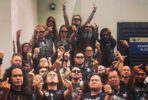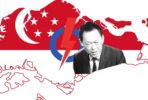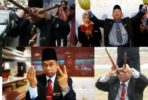Tensions are running high between Indonesia and Singapore over the former’s decision to name a naval vessel after two convicted members of the Indonesian Marine Corps, who carried out the bombing of the MacDonald House office building in Singapore on March 10, 1965.
The bone of contention lies in how Harun Said and Usman Ali, the two Indonesian commandos, are seen by both countries.
In Singapore, they are the perpetrators of the bombing of a civilian target, while the Indonesian government sees them as national heroes who carried out their duty during Konfrontasi (1963-66) with Malaysia.
The disparate labels for the two men are understandable considering Singapore, still part of Malaysia at the time, and Indonesia were locked in a dispute that stemmed from the latter’s objection towards the formation of the federal state of Malaysia, encompassing large swathes of territory on the island of Borneo that Indonesia had laid claim to.
However, objectively speaking, were Usman and Harun terrorists or were they war heroes?
Merriam-Webster’s dictionary defines terrorism as the use of violent acts to frighten the people in an area as a way of trying to achieve a political goal. By this definition alone, what the two men did qualifies as an act of terrorism.
Singaporean police records state that when they were arrested floating at sea, the two men said they were a fisherman and a farmer, before later confessing to the bombing.
However, it was not until later, during their trial for murder, that the two revealed they were members of the Indonesian Marine Corps with express orders to cause trouble in Singapore as part of confrontation with Malaysia. Apparently, the two men chose to reveal their status in the hope of being treated as prisoners of war under the Geneva Conventions.
When the presiding judge denied them POW status – on the grounds that members of enemy armed forces who are combatants and who come here with the assumption of the semblance of peaceful pursuits and divest themselves of the character or appearance of soldiers, but are captured, are not entitled to the privileges of prisoners of war – Usman and Harun retracted their statements that they were members of the Indonesian military.
Despite lobbying by the Jakarta government for their release, Usman and Harun were found guilty of murder and sentenced to death. However, when their bodies were brought back to Jakarta after their execution in 1968, the two were interred in the National Heroes Cemetery with full military honours.
It could well be argued that the granting of national hero status to the two men was Indonesia’s way of saving face after a failed diplomatic attempt to have the two released.
It was also a delicate time for Indonesia as the new government under then President Sukarno was trying to extricate itself from the confrontation.
The hero status for both men was also anomalous even by Indonesian standards, as people given this recognition are usually those who perished in combat against enemy forces. Usman and Harun never actually met these criteria – as never during Konfrontasi did the Indonesian government nor its Malaysian counterpart officially declare war on each other.
So, essentially, both were perpetrators of a state-sponsored act of terrorism. Hence, the adamant position by the Singaporean government that Usman and Harun were terrorists.
By the same token, Indonesians should look at the incident as a lesson in how not to conduct bilateral relations. Sukarno’s accusation that Malaysia was a puppet state of the United Kingdom has never been proven.
To date, it remains obscure why Sukarno instigated the unofficial war against Malaysia in 1963. Some historians have argued that his earlier success in wresting Papua from the Dutch emboldened him to try a similar tactic with the former British Malaya, though Sukarno always publicly denied any territorial ambitions. Nevertheless, Sukarno’s coveting Malaysia as part of a Greater Indonesia may not have been just a flight of fancy.
In many ways, his model for the state of Indonesia was the ancient Majapahit Empire, which encompassed Indonesia, Malaysia, the Philippines and parts of Thailand and Indochina.
Whatever his motives, the border skirmishes and acts of sabotage against Malaysia during Konfrontasi appeared to be designed to provoke the British, who had granted independence to Malaysia in 1957, into declaring war against Indonesia. Had they done so, Sukarno would certainly have obtained his evidence that Malaysia was simply an extension of British imperial powers.
Johannes Nugroho*
###
*Johannes Nugroho is a writer and businessman from Surabaya. This is the personal opinion of the writer or publication and does not necessarily represent the views of The Malaysian Insider.
Source: The Jakarta Globe









